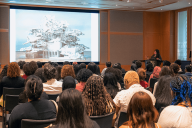You have /5 articles left.
Sign up for a free account or log in.

To promote career preparation among students studying the humanities, Old Dominion University is launching an internship academy focused on these students and their experiential learning opportunities.
roonierella/ iStock/Getty Images Plus
A $5 million grant from the Andrew W. Mellon Foundation will boost internship participation rates among students in the humanities at Old Dominion University in Virginia, providing needed experiential learning and career support for students.
Launching this fall, the Monarch Humanities Internship Academy will support hundreds of students each year in securing paid internships to help them in their careers, as well as build talent pipelines for regional employers and beyond.
The Monarch Internship and Co-Op Office at ODU is leading the development and rollout of the academy, which began this spring, working to an institutional goal to provide all students with experiential learning by 2027.
The background: Less than one-third (29 percent) of students in humanities majors at ODU completed internships between 2014 and 2022, according to data from graduating seniors. The university has around 2,000 students enrolled in humanities programs, according to a press release.
The largest hurdles to participation were work obligations, a lack of knowledge around internships, a lack of available opportunities, family responsibilities and travel to and from campus.
A winter 2023 Student Voice survey by Inside Higher Ed, conducted by College Pulse, found 50 percent of arts and humanities students nationally are required to complete an internship in their program, but 27 percent of arts and humanities students have never completed an experiential learning or internship experience.
Research from the National Association of Colleges and Employers found, among the graduating class of 2021, students who completed paid internships received more job offers on average (1.12) compared to those without internship experience (0.64) or those with unpaid internship experience (0.85).
At ODU, campus leaders established experiential learning as a cornerstone of the student experience in the most recent strategic plan, with a goal to provide each student with hands-on learning by 2027, explains Barbara Blake, executive director of internships and co-ops.
To bridge this gap, leaders at ODU created the Monarch Humanities Internship Academy, funded by the five-year Mellon Foundation grant, which gave a total of $25 million to five public colleges and universities.
“We want to make sure that humanities majors on our campus can really feel supported, and mindful to know that yes, there is a pipeline and a pathway for you and we’re going to make sure that you get a great work-based learning experience,” Blake says.
How it works: Students in relevant majors will be eligible for the program, representing around 2,000 undergraduate students at ODU, Blake says.
The grant has several key focuses: stipend funding for unpaid or underpaid internships, dedicated staff, faculty development, a first-year learning community and creation of internship opportunities.
To remove barriers to participation, the grant will fund stipends to students who take on unpaid or underpaid internships in humanities field.
“Oftentimes in the humanities, especially when you’re working with nonprofits, many of those wonderful opportunities, they’re unpaid,” Blake says. “And so sometimes not all of our students can engage in those wonderful opportunities when they are unpaid.”
The grant also designates funding for organizations that support social causes. The university plans to support 750 students at minimum with stipends, but the exact amount or number of students per term has yet to be determined.
This summer, 10 students will participate in a pilot program of stipend funding to help guide future decision-making, Blake says.
In addition to completing the internship, students will prepare electronic portfolios, demonstrating their experiences in a tangible way for future employers or graduate school applications.
The program is staffed by two recently hired assistant directors and a program specialist, charged with providing advising, coaching, assistance and support to humanities students in internships (whether they receive grant stipend funds or not).
“It’s not just about getting them to apply and getting them an offer, but it’s also about persistence,” Blake says. “We want them to stay, we want them to complete and we want the experience to be a really productive, impactful one.”
Within humanities programs, staff from the Office of Institutional Effectiveness and Assessment and the Office of Academic Success Initiatives and Support will partner with faculty members to map curriculums with additional experiential learning opportunities, hoping to connect in-class learning to careers throughout students’ time at the institution.
For incoming first-year students, starting this fall, ODU will offer a learning community focused on humanities and careers, helping learners see the power of a degree in the humanities, exposing them to experiential learning opportunities and highlighting support from the institution early in the college career.
What’s next: ODU received the grant award notification in late fall 2023 and started implementing and strategizing for next steps this spring, Blake explains. “Most of these things we have been doing in the spring, really kicking off pilots and initial sessions in the summer. We were very excited to start rolling, live and ready to go, in the fall.”
University leaders met with current humanities students in a design-thinking workshop this spring to flesh out what an internship could look like and how the university can support this work. There’s a second workshop on the calendar for July, providing qualitative data that will lead future conversations, Blake says.
The university is also meeting with outside organizations, including local nonprofits and national groups based in Washington, D.C., to establish relationships focused on accessible internship offerings for learners. One of the great things about a post-COVID job market is the growth in remote and hybrid positions, Blake says, so the university can look broadly to find applicable experiences.
Faculty workshops are scheduled for early June and throughout the summer, allowing professors to make immediate changes to their courses for the fall. One innovation is a new LMS (learning management system) page for humanities majors with modules on internships with videos and other information.
University leaders hope the initiative is a win-win-win for students, faculty members and employers, creating visibility for the wide variety of careers open to college graduates and providing meaningful job placements for learners in their fields.
If your student success program has a unique feature or twist, we’d like to know about it. Click here to submit.
This article has been updated to clarify that only undergraduate students are eligible for the Mellon grant.








